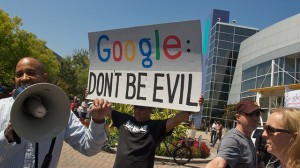This piece was first published at The Huffington Post.

Net Neutrality protest at Google HQ (Photo: Flickr / Steve Rhodes / CC 2.0)
According to The Wall Street Journal, instead of preventing discrimination with real Network neutrality rules, FCC Chairman Tom Wheeler will propose a new set of rules in response to the January court decision that struck down open Internet protections. These new rules would allow Internet service providers like Comcast or Verizon to charge content providers an extra fee to fast track their content to end users like me and you. According to the proposed rules, big Internet companies would be able to decide whether or not to charge content providers a toll based on a subjective standard called “commercial reasonableness.” Disguised as Network neutrality, these proposed rules stand to create an Internet where the biggest producers of content, like Netflix and MSNBC, will pay more to push their products to wider audiences. Smaller content producers who can’t afford to pay may be pushed onto a digital dirt road, unable to raise a powerful public voice online.
The rules will be officially proposed during the next FCC public meeting on May 15, launching a public comment period.
Unofficially, the Internet is already bursting at its digital seams with opposition to the proposed rules, calling them “fake Net neutrality.” Joe Torres of Free Press is concerned that FCC Chairman Wheeler’s perspective on rule-making in this case may be compromised. “The FCC chairman plans to deliver a gift to [Internet service providers] — some of the most powerful and profitable corporations in the world. These companies used to employ him as a lobbyist in their efforts to mute the most vulnerable voices in our society. The chairman’s proposal to allow discrimination online is simply unjust and immoral, and will result in greater inequality in our society. It is a plan that must not be allowed.”
Steven Renderos, campaign organizer with the Media Action Grassroots Network, echoed Torres’ strong sentiments, concerned that constituency-based organizations may be among those kept offline if the proposed rules pass. “In Philadelphia, community leaders have just launched a campaign to make sure Comcast actually meets the needs of underserved communities when they franchise. What incentive does Comcast have to play fair at the local level if the feds tell them discrimination for profit is okay?”
Though Chairman Wheeler insisted in a recent blog post that concerns over digital discrimination with the proposed rules is “unfounded” and based on “a great deal of misinformation,” even the man credited with inventing the World Wide Web disagrees.
Much of the debate seems predicated on which consumers will be most affected if content providers pass the buck on paying increased costs. So, let’s talk about exactly which consumers stand to lose the most. About 100 million people in the United States live with little-to-no Internet access. Of those, the vast majority are black, Latino or from households with annual incomes under $50,000. Many communities of color and low-income families that struggle to access the Internet in their homes turn to their cell phones as their primary means of Internet connection with the assistance of heavily scrutinized broadband subsidies. Raising barriers to digital access for communities faced with these extraordinary challenges to Internet access in a digital age can mean the difference between employment and poverty, health care and sickness, democratic engagement and exclusion. For these Internet users, the cost of connecting is already too high.
Who are they?
CREDOAction, colorofchange.org, presente.org and other platforms specifically designed to elevate the online voices of people of color and progressives are small content providers.
Racial justice networks like the National Alliance of Domestic Workers, Strong Families, National Day Laborers Network and the Media Action Grassroots Network are small content providers.
Colorlines, Public News Service, Feministing, The Nation and the wide range of bloggers and ethnic and progressive media outlets are small content providers.
Small businesses owned by people of color, both migrant and citizen, are small content providers.
Together, these organizations and companies provide the content many depend on to connect and organize for racial equity. These content providers are rarely found in the debate on Network neutrality, yet they stand to lose big if the FCC succeeds in allowing the corporate gatekeepers that currently control our Internet to charge more for greater visibility.
Jessica Gonzalez, vice president and general counsel of the National Hispanic Media Coalition said, “If published reports are accurate, we may be on the cusp of a new era of the Internet, ruled by powerful gatekeepers and manipulated to the detriment of the millions of voices that, to this point, have made the Internet the democratizing force that it is today.”
Still — as with cable, broadcast and print media — the Internet remains one of the few ways individuals and groups can access information, connect with a wider audience and watchdog power.
A cornerstone feature of a democratic nation is the ability of its residents to raise a dissenting voice. As the racial wealth gap widens, incarceration of people of color exceeds even 1960s rates, and racial stereotypes in the media fuel white vigilante murders of blacks and a broken immigration system — the need to level the playing field for representation is at an all time high.
Yet the Federal Communications Commission insists that its priority as a regulatory agency is to ensure the rights of the largest telecommunications companies to profit where profit can be made. The FCC isn’t proposing Network neutrality, it’s legalizing discrimination. As a nation struggling to close historic racial and economic gaps, I’d say we’ve had enough of that.
Now is the time for small content providers to raise their voices, while they still can. I’ll be calling on the good people of the commission to do the right thing, and propose real Network neutrality rules that keep all voices online and heard. You can make that call too.
Because no matter how commercially viable discrimination may be, it is never reasonable.


